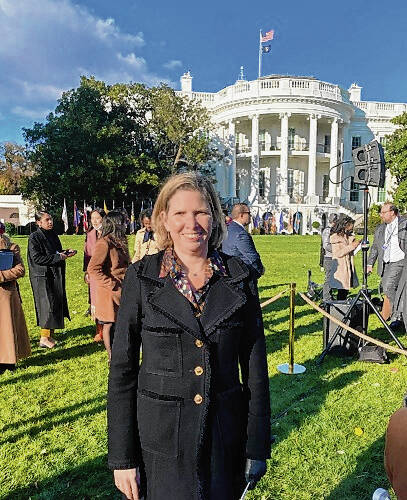
Cummins President and Chief Operating Officer Jennifer Rumsey is shown at the White House Monday where she attended the infrastructure bill signing by President Joe Biden.
Photo provided by Cummins
WASHINGTON — A Cummins executive was among a group of business and political leaders from both parties who joined President Joe Biden on the White House lawn Monday as he signed a $1 trillion infrastructure bill into law.
Cummins Inc. President and Chief Operating Officer Jennifer Rumsey was at the White House for the signing ceremony for the bill, though she said she did not have the chance to meet Biden or Vice President Kamala Harris.
Cummins, which is based in Columbus and employs about 8,000 in the area, has supported the bill, viewing it as an opportunity to help accelerate the path to decarbonization in the country and jump start the development and adoption of green hydrogen and other cleaner energy as companies, including Cummins, confront the challenges of climate change.
“There was a piece of this infrastructure bill that was focused on starting to build out an infrastructure that we think is key for decarbonization and our country,” Rumsey said after attending the bill signing late Monday afternoon. “It includes substantial investment in hydrogen infrastructure and charging infrastructure and also recognition of the importance of low-carbon fuels. And when we think about the work ahead for our country and our world to really decarbonize some of these sectors, it requires the infrastructure to come together with the advancement in the technologies on the product side, and so we hope that this will be a catalyst towards driving that decarbonization path.”
The measure, which cleared the House on Nov. 5 in a 228-206 vote, includes money for roads, bridges, ports, rail transit, safe water, the power grid, broadband internet, the removal of lead pipes and more, and has been cast as a bipartisan bill of sorts.
The Senate passed the legislation on a 69-30 vote in August after rare bipartisan negotiations, and the House kept that compromise intact, The Associated Press reported. The agreement ultimately got support from 19 Senate Republicans and 13 House Republicans.
However, the entire congressional delegation representing Columbus — Rep. Greg Pence and Sens. Todd Young and Mike Braun — voted against the bill, federal records show.
The bill provides $110 billion to repair the nation’s aging highways, bridges and roads. According to the White House, 173,000 total miles of America’s highways and major roads and 45,000 bridges are in poor condition.
The almost $40 billion for bridges is the single largest dedicated bridge investment since the construction of the national highway system, according to the Biden administration.
A total of 14 bridges in Bartholomew County are listed in “poor” condition and another 119 were listed in “fair” condition — together representing roughly half of the county’s 267 bridges — according to 2021 figures from the Federal Highway Administration.
The $39 billion for public transit in the legislation would expand transportation systems, improve accessibility for people with disabilities and provide dollars to state and local governments to buy zero-emission and low-emission buses, according to wire reports.
A total of $65 billion in the bill is set aside for improving the reliability and resiliency of the power grid and $7.5 billion for electric vehicle charging stations, according to wire reports. It would also boost carbon capture technologies and more environmentally friendly electricity sources like clean hydrogen.
The bill also includes $66 billion to improve Amtrak service in the Northeast Corridor, as well as other routes, including the potential for a proposed Amtrak stop in Columbus that would connect the city by passenger rail to Indianapolis, Chicago, Louisville, among other cities.
The five-year spending package would be paid for by tapping $210 billion in unspent COVID-19 relief aid and $53 billion in unemployment insurance aid some states have halted, along with an array of smaller pots of money, including petroleum reserve sales and spectrum auctions for 5G services, according to wire reports.
For her part, Rumsey said one of the positives of the bill was that it brought a lot of different stakeholders together to solve what she described as a “key challenge” for the country and world.
“As we think about climate change — which we really view as the existential crisis of our time — it requires multiple stakeholders coming together,” Rumsey said. “It requires government, it requires industry, it requires academia. …Even if you look at all of the people that participated in that event today and the bipartisan support that it had, it’s the kind of thing that we think is really positive to help bring these different stakeholders and constituents together and try to solve what we think is a key challenge for our country and our world.”
—The Associated Press contributed to this report.




